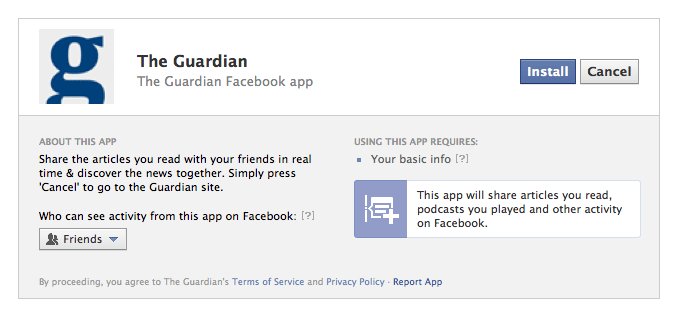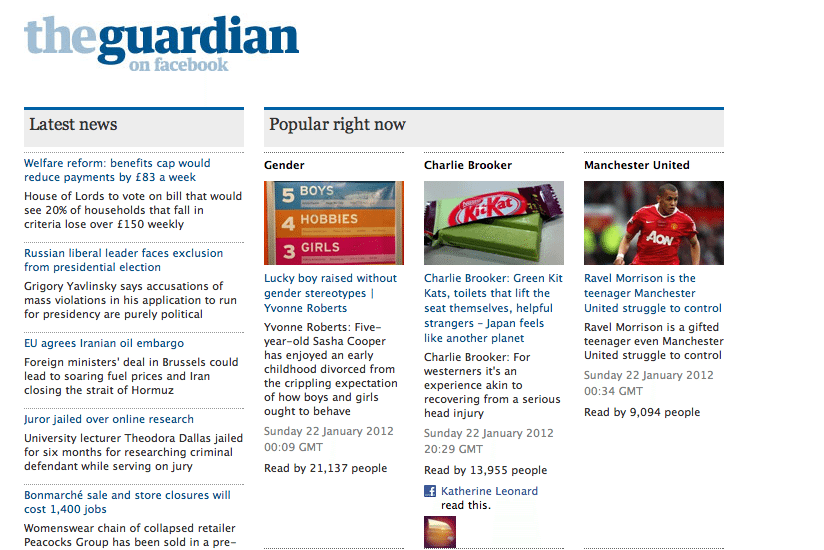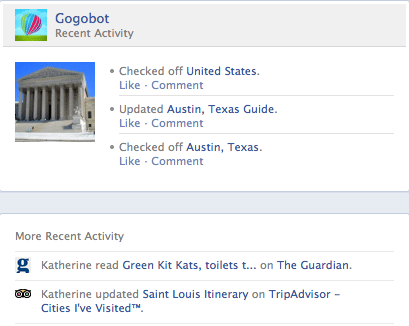Big news! Facebook is, like, expanding it’s vocabulary.
Back in September Mark Zuckerberg set out to blow the minds of the social world, announcing a new generation of Facebook applications otherwise known as “lifestyle apps” or “open graph apps.” Facebook even released this snazzy video to help convince us that the apps will change not just our virtual lives, but our real lives too. Awesome, guys.
The first wave of apps was released immediately after f8 and included Spotify and The Washington Post. You probably noticed these updates in the Ticker box on the upper right corner of your news feed. The ever-expanding world of Facebook critics cried out that this information was oftentimes trivial and irrelevant. But on a personal note, I enjoy the opportunity to snicker when I see that my coworker is reading an article about Snooki’s recent weight loss (true story). Thanks, Mark. Seeing the embarrassing things your friends do is beyond the point, though.
For years, “like” was the social action available (as if we needed to hear that word any more than we, like, already do). So we were bombarded with menial messages along the lines of “Steve Jones likes Roka Akor” and “Susie Smith likes Protein Bar.” But the monotonous verb didn’t do justice to the the distinguishing qualities of each brand.
Now we’ve learned that Facebook envisions a new vocabulary for the social narrative. What if we spice things up by expanding Facebook’s verb count?
At f8 Zuckerberg promised marketers that the expanded verbage would bring new life to Facebook’s commoditized brand mentions, also known as “Sponsored Stories.” Stories like “Will pinned this item on Pinterest” or “Nick wishlisted Barcelona on Gogobot” add a pleasant sense of variety to Facebook activity, and according to Zuckerberg, will be more likely to grab other Facebook users’ attention (and clicks).
Last week Facebook announced the launch of their second round of lifestyle apps. Meet 60 new open graph applications, each accompanied by a unique social verb that Facebook has never seen before.
How it works
I browsed the list of applications and found a few that I thought looked interesting (and not too embarrassing) to share with my entire network of Facebook friends. Here’s a look at how things go down with social apps:
1. Select the app and connect.

2. Use the application

3. User-generated ads!

Facebook automatically pushes this activity (new verbs included!) to your Facebook friends in several places: your Timeline, the Ticker box and the traditional news feed. Because brands are paying for this, Facebook throws in a little bonus by allowing this activity to linger on your profile rather than being immediately replaced by more recent activity.
What it means for marketers
That the whole “like” verb is getting a bit trite, so why not expand the social actions surrounding your brand? The new open graph applications give marketers the opportunity to give Sponsored Stories more juice. Attaching a branded verb to your business makes for a more interesting narrative and increases the chances for online dialogue.
Diversified vocabulary and a little more bang for your ad buck. Not too shabby.